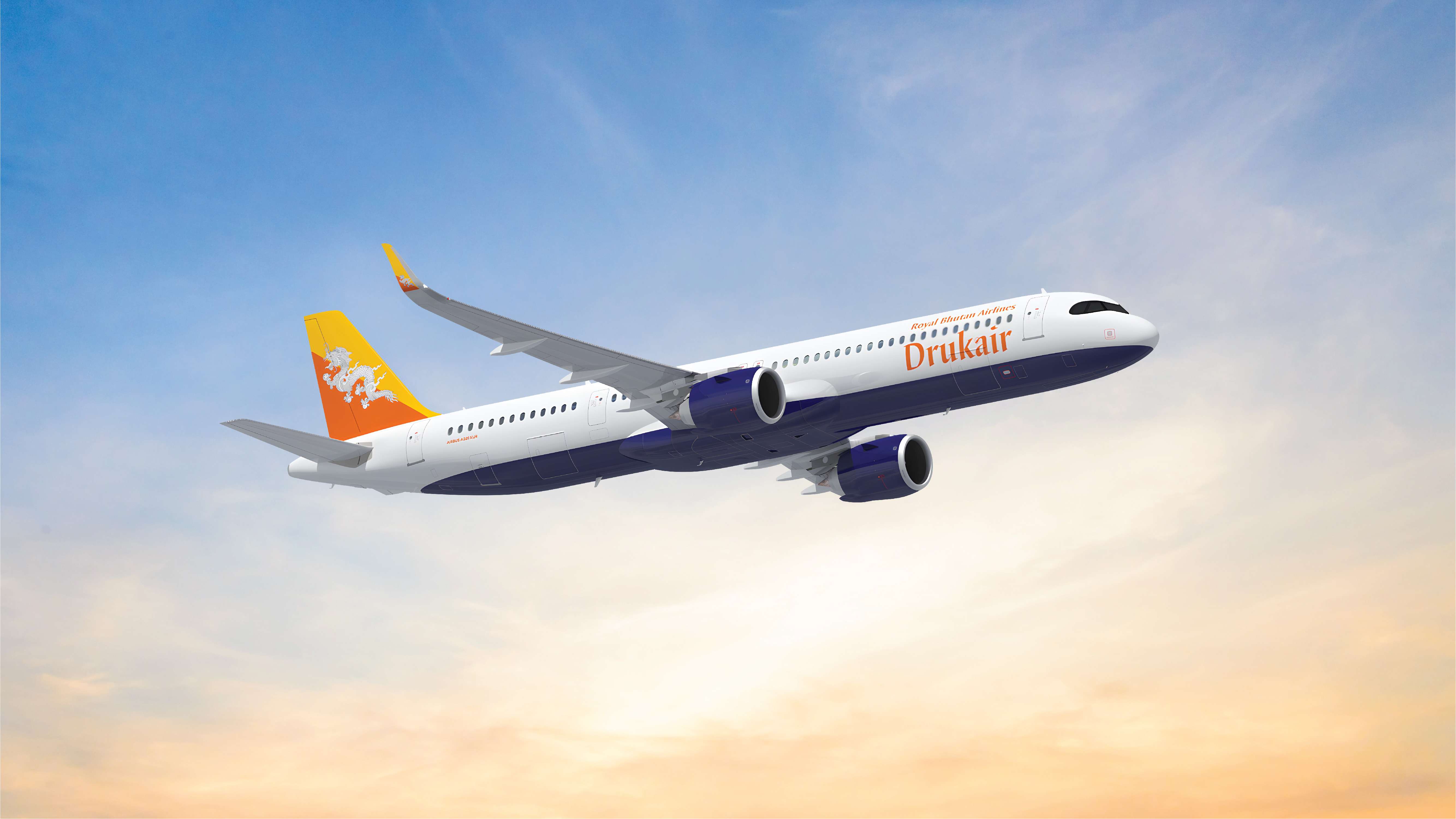(Posted 23rd July 2024)
Royal Bhutan Airlines, the national flag carrier of the Kingdom of Bhutan, a fully owned subsidiary of the state holding company Druk Holding and Investments Limited (DHI) has signed a Memorandum of Understanding (MoU) with Airbus for 3 A320neo and 2 A321XLR aircraft to expand its international network.
The new aircraft are anticipated to start delivery in 2030. The airline plans to fly these aircraft out of Paro International Airport and the new airport at Gelephu Mindfulness City (GMC), envisioned to become Bhutan’s futuristic economic hub. From here, Drukair will expand its connectivity to Europe, South East Asia and Australia.
Drukair already operates four Airbus A320 Family aircraft consisting of three A319s and one A320.
Based on His Majesty Jigme Khesar Namgyel Wangchuck’s vision, GMC, located in the southern plains of Bhutan, is emerging as a new economic engine for the Kingdom. As the national carrier, Drukair plays a pivotal role in enabling the prosperity of GMC and Bhutan by efficiently and reliably meeting growing transportation and logistics needs.
Tandi Wangchuk, Drukair CEO said, “We are thrilled to embark on this new chapter in Drukair’s history, which dovetails perfectly with development of the Gelephu Mindfulness City and work to expand the Gelephu airport. Our investment in these state-of-the-art aircraft underscores our dedication to supporting Bhutan’s vision of holistic and mindful development.”
Executive Vice President Sales of Airbus Commercial Aircraft business Benoît de Saint-Exupéry said: “We are grateful to Drukair for reaffirming their trust in Airbus to power their next phase of growth. Airbus has been a long-standing partner of Bhutan and we are extremely proud that our latest generation aircraft will be a part of the Kingdom’s next chapter of development, connecting the Gelephu Mindfulness City to the rest of the world.”
Drukair is headquartered in Paro, Bhutan, and operates scheduled flights to 10 international destinations, including five countries in the South Asian region. Drukair also operates to three domestic destinations.
The A321neo is the largest member of Airbus’ best-selling A320neo Family, offering unparalleled range and performance. By incorporating new generation engines and Sharklets, the A321neo brings a 50% noise reduction and more than 20% fuel savings and CO? reduction compared to previous generation single-aisle aircraft, while maximising passenger comfort in the widest single-aisle cabin in the sky. To date more than 6,400 A321neos have been ordered by more than 90 customers across the globe.
The A321XLR is the next evolutionary step from the A320neo which responds to market needs for even more range and payload, creating more value for the airlines. It will deliver an unprecedented Xtra Long Range of up to 4,700nm – 15% more range than the A321LR and with 30% lower fuel burn per seat compared with previous generation competitor aircraft, as well as reduced NOx emissions and noise. For passengers, the A321XLR’s new Airspace cabin will provide the best travel experience, while offering seats in all classes with the same high-comfort as on a long-haul wide-body, with the low costs of a single-aisle aircraft. So far, Airbus has secured more than 500 orders for the aircraft.

As with all Airbus aircraft, the A320 family is already able to operate with up to 50% Sustainable Aviation Fuel (SAF). The manufacturer is targeting to have its aircraft up to 100% SAF capable by 2030.
Meanwhile has Airbus and the Airports Council International (ACI) World association have signed a cooperation agreement to support the industry’s efforts to reduce the environmental impact of aviation.
This partnership leverages the strengths of the world’s leading aircraft manufacturer and the largest and most important international association of airports to make significant progress in both decarbonising aviation and mitigating aircraft noise impact.
This alliance will address key areas including Sustainable Aviation Fuels (SAF), hydrogen technologies, advanced air mobility, operations efficiency, and aircraft noise management practices. It will foster the exchange of information and perspectives on low carbon operations, communicate industry progress, jointly develop guidance materials, and potentially formulate unified positions on policies and standards to achieve the industry targets.
“This partnership marks a significant step in our collective efforts to reduce aviation’s environmental impact,” said Julie Kitcher, Airbus Chief Sustainability Officer. “By combining our technological expertise with ACI World’s vast network and operational insights, we aim to influence policies and standards that support sustainable aviation and drive industry-wide innovation. Together, we can create a cohesive and aligned approach to achieving our decarbonisation targets and enhancing the sustainability of the global aviation sector”.
ACI World Director General and CEO Luis Felipe de Oliveira said: “Airbus and ACI World’s groundbreaking cooperation agreement marks a pivotal step in our journey towards a net-zero carbon aviation industry. This strategic alliance underscores the unwavering commitment of airports worldwide to sustainable aviation, ensuring that we not only reduce our environmental impact but also maximise the socio-economic benefits of air travel. By focusing on key areas such as Sustainable Aviation Fuels, hydrogen technologies, advanced air mobility, operational efficiency, and aircraft noise management, we are setting new benchmarks for sustainability in aviation, and paving the way for a greener future”.
This collaboration builds on the successful partnership between Airbus and ACI EUROPE, which began two years ago and which has significantly strengthened the relationship by working together on the deployment of alternative energies including hydrogen and SAF within European alliances, sharing technical data with European airports and communicating progress at key industry events. The expansion of this collaboration to a global scale underscores the importance of integrated efforts between aircraft manufacturers and airport operators on a global scale.





